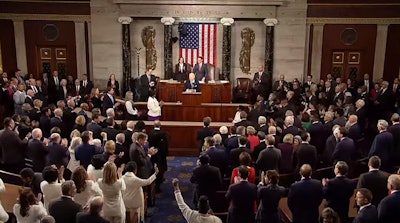 President Biden addresses Congress on March 7.
President Biden addresses Congress on March 7.
While speaking on his administration’s accomplishments in his last four years of service, Biden also addressed what he called “the future of possibilities we can build together.”
Biden has made access to affordable education a cornerstone of his presidential tenure, and he reinforced that position by calling for an increase in Pell Grants and a further increase in “our record investments in HBCUs [Historically Black Colleges and Universities] and Hispanic and Minority Serving Institutions [HSIs and MSIs].”
Scholars say that they were pleased by the president’s mention of these institutions and hope to see his call to action translate into increased funding for these under-resourced yet high-achieving institutions.
“[The speech] was very fiery,” said Dr. Pietro A. Sasso, an associate professor of higher education at Delaware State University, an HBCU in Dover. “That tone and fervor carried over when he talked about HBCUs and MSIs and HSIs. He was just as passionate and bold when he was talking about that in the same way he talked about other crises. It’s not just student loans, it’s trying to engage in addressing the structural funding inequities.”
 Dr. Royel M. Johnson, professor at the Rossier School of Education at the University of Southern California (USC) and director of the National Assessment of Collegiate Campus Climates in the USC Race and Equity Center.
Dr. Royel M. Johnson, professor at the Rossier School of Education at the University of Southern California (USC) and director of the National Assessment of Collegiate Campus Climates in the USC Race and Equity Center.
“The Biden-Harris administration has already made critical investments in HBCUs, including over $7 billion in various supports such as COVID relief, debt relief, and grant funding to expand academic capacity,” said Johnson.
In September 2023, the administration offered $93 million in research and development grants to HBCUs, Tribal Colleges and Universities (TCUs), and other MSIs. Those funds came on top of another $50 million in research grants for HBCUs and other MSIs offered just one month before.
“These actions are commendable and necessary but are insufficient for addressing the deep-seated inequities that continue to shape their existence,” said Johnson. “I hope the administration will continue to take serious and sustained actions to address past wrongs, so they can continue serving our students in the important ways they do.”
Sasso said the role of MSIs has become even more important in the wake of anti-Diversity, Equity, and Inclusion (DEI) legislation being written and passed across the U.S., particularly in the south, in states with high populations of Latinx and Black citizens.
“We’re becoming more diverse as a country. Generation Z and Generation Alpha have so many more intersecting identities with so many layers,” said Sasso. “We need to understand our country. And if we want to move the country forward with progress, not backwards, then we really need to understand who we’re educating. HBCUs and MSIs are well-positioned to do that.”
Sasso emphasized that students of color who live in or plan to attend colleges in states with anti-DEI legislation are more likely to find safe refuge in institutions like MSIs.
“Cutting DEI programs phases out college pathway programs, precollege bridge programs that expand access, shut down peer and social networks that help lead students into higher education,” said Sasso. “With these DEI bans, it scares universities from investing in and creating structural diversity that makes students feel like they’re not tokenized. The role of HBCUs and HSIs is even more important now than ever.”
 Dr. Melanie Carter, associate provost and director of the Center for HBCU Research, Leadership, and Policy and associate professor in Educational Leadership and Policy Studies at Howard University.
Dr. Melanie Carter, associate provost and director of the Center for HBCU Research, Leadership, and Policy and associate professor in Educational Leadership and Policy Studies at Howard University.
“He really talked not only about his vision for America, but how he would operationalize it in real terms, in real ways, that has real meaning for people,” said Carter. “I think there’s evidence that his continued vocal support of HBCUs has made our institutions even more prominent in the minds of funders, philanthropists and others.”
Just last year, Biden and his cabinet members, Secretary of Education Dr. Miguel A. Cardona and Secretary of Agriculture Thomas Vilsack, sent letters to 16 state governors in support of the 19 land-grant HBCUs created in 1890. By law, states were required to fund these institutions at the same level as their white counterparts—but only two states, Delaware and Ohio, fulfilled their promise. The letters called for the governors to take action on the over $12 billion owed to these institutions.
“$12 billion in underfunding since 1890—that’s tremendous,” said Carter.
Increased funding opportunities for both institutions and students create a greater capacity to serve. Biden’s call to increase the Pell Grant, Carter said, would influence the “75% or so of students at HBCUs who receive Pell Grants. [Increasing Pell] will have a tremendous impact on students’ ability to enroll and complete.”
“When you think about education, it’s a civil right, but it’s also equity. Folks’ access to the American Dream depends on resources, support, structure, and the system,” said Carter. “Higher education is an important vehicle to move people from where they are to where they want to be. It’s critical to democracy, if we mean one that’s inclusive and just.”
Liann Herder can be reached at [email protected].






















